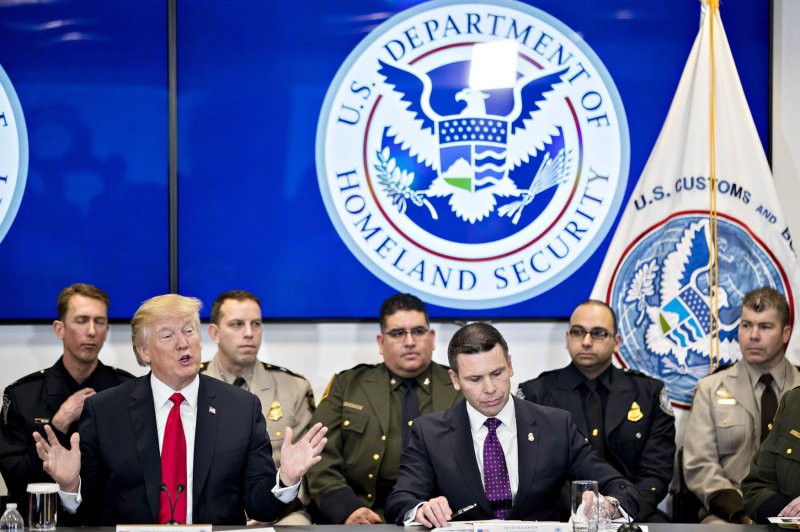U.S. President Donald Trump (L) speaks as Kevin McAleenan, acting commissioner of the U.S. Customs and Border Protection (C) listens while participating in a Customs and Border Protection roundtable on February. 2. McAleenan appeared before the Senate judiciary committee Tuesday defending CBP agents' use of tear gas on migrants in Tijuana and lending his support for a "modern border wall." File Photo by Andrew Harrer/UPI |
License Photo
MEXICO CITY, Dec. 11 (UPI) -- U.S. Customs and Border Protection Commissioner Kevin McAleenan on Tuesday defended tear gassing "assaultive" migrants across the U.S.-Mexico border in Tijuana at the end of November and denied officers targeted women and children.
He spoke about his agency's use of force policies, including shootings and tear gassings when he appeared before a Senate judiciary committee hearing about border security.
CBP is part of the Department of Homeland Security, which also includes Border Patrol. CBP's three main functions are counter-terrorism, border security and trade enforcement. McAleenan oversees 60,000 employees with a budget of $13 billion.
Sen. John Cornyn, R-Texas, summed up McAleenan's responsibilities, "You have one of the most difficult jobs in the U.S. government: protecting the nation while facilitating lawful trade."
The committee hearing focused on the challenges the Central American migrant caravan presented to CBP at the southern border in Tijuana, Mexico.
"It is both a border security and humanitarian crisis," McAleenan told lawmakers in his opening statement.
Tear gas in Tijuana
"The American people are generous people," judiciary Chairman Chuck Grassley, R-Iowa, said in his opening remarks, "but they are also clear that they don't want open borders."
Grassley went on to ask McAleenan about Border Patrol officers' use of tear gas on members of the migrant caravan in Tijuana on Nov. 25.
"Our agents were in a difficult situation," McAleenan said as he described how 1,000 migrants from the Central American caravan made a "chaotic attempt" to enter the United States for almost 5 hours over a 2.5-mile stretch of border between Tijuana and San Ysidro, Calif.
McAleenan defended Border Patrol agents' use of force on migrants, including tear gas and pepper spray. To Sen. Dianne Feinstein's concerns that Border Patrol targeted young children, McAleenan denied agents sought to tear gas women and children. He indicated instead that "agitators" throwing rocks provoked the U.S. officers' response.
McAleenan said almost five years to the day CS gas was used on a large group of people in "the same exact area" of the Tijuana river, "including women and children as well."
Feinstein, D-Calif., responded by asking whether CBP's use of force manual needs to be changed.
"CBP's use of force manual, as I understand it, does not specifically authorize tear gassing young children. Do you think CBP needs to change its use of force policies so that children are not harmed going forward?"
"Our policies do not authorize tear gassing young children. Nor did that happen," McAleenan said. "The full description of this situation will come out in the review and we will be transparent about that."
McAleenan told the judiciary committee that a use of force investigation is proceeding.
"It's very unfortunate that women and children were in the vicinity of this large group that was trying to enter the United States," McAleenan told Feinstein.
The border wall as a spending priority
The border wall funding provoked the sharpest exchanges between the CBP commissioner and senators on the judiciary committee.
"I know the president wants to focus on the families from three countries in Central America but I want to ask you this: Why are we focusing on building a $5 billion wall when your resources and technology by your own admission are not up to the task of stopping the flow of fentanyl to the United States," asked Sen. Dick Durbin, D-Ill.
Durbin posed his question about spending priorities by reminding McAleenan that life expectancy in the United States has dropped because of drug overdoses resulting from the opioid epidemic.
"Fentanyl is killing Americans, innocent Americans every day," Durbin said.
Durbin pointed out that the president has only asked Congress for $44 million for screening systems for hard narcotics but has asked for wall funding for $5 billion.
"We are extremely concerned by hard narcotics -- fentanyl, methamphetamine -- into the United States," McAleenan responded, saying his agents were passionate about their counternarcotics mission.
"Your budget request doesn't reflect that passion," Durbin responded, "It's all about the wall."
"The walls are very important because we have increased hard narcotics coming in between ports of entry," McAleenan responded.
When Durbin asked McAleenan if he wanted a concrete wall, the CBP commissioner said, "We are looking for a steel bollard wall with modern wall systems, cameras and sensors."
When asked by Sen. John Kennedy, R-La., why the Saudi government was building a 600-mile border wall with Iraq, McAleenan's said, "I think they realize that investing in infrastructure and security helps create a better security environment between countries and hopefully drives folks to the lawful means of entering and leaving."
Unlawful immigration is at historic lows. Even so, McAleenan said he "fundamentally disagreed" with commentators who do not think the border is in crisis, emphasizing his support for a wall at tactical points along the border, augmented by technology and agents.
"We have not asked for a wall system for 1,954 miles of the border. Only where it would be an effective part of an integrated border security strategy," McAleenan told senators.















